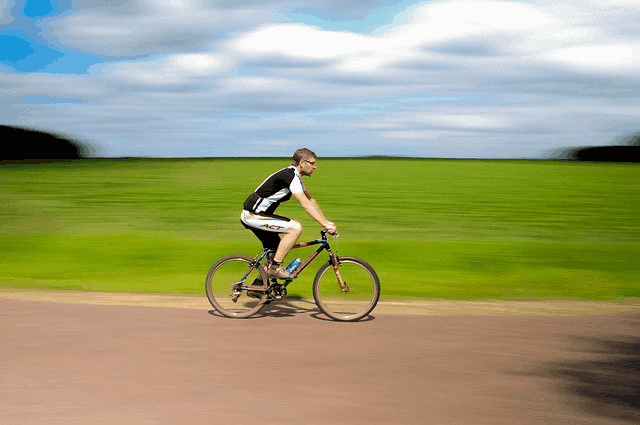Take a look at these incredible physical and mental health benefits of cycling, and you’ll dust off your bike in a split second.
You need to start moving! Whether it’s for weight loss, stress management, or spending quality time with your kids. Like most of us, you have been cooked up inside because of COVID-19 for far too long, and now it’s time to get those muscles busy again.
Of all the physical activities, cycling is the best choice, especially if you do it with your family. Besides being low impact, it will also take you back to nature, making it a perfect activity during this global pandemic.
5 Mental Health Benefits Of Cycling
Cycling can reduce depression and anxiety
According to UK research, one of the top mental health benefits of cycling: it can make you happier. The results showed an increase of 32% in well-being scores for cyclists compared to the inactive population. Cycling takes you outside and gives you the change of scenery, offering you an opportunity to step away from the stressor.
Those suffering from depression and anxiety can improve their mood because of the endorphins and adrenaline released into the body. Moreover, riding a bike from point A to point B is an accomplishment that can boost your self-esteem and build confidence.
Peddling for brain health
Improved circulation implies more blood to the brain — 28% more, according to a Japanese study. Blood carries lots of nutrients that are important for brain health. So, turning those wheels around may reduce the risk of dementia or even Alzheimer’s disease.
Ensure your brain gets the boost it can get; cycle at least 45 to 60 minutes four times a week. Cycling is a game that people of all ages can do, so this may be the perfect activity for elderly patients to improve their physical and mental health. It is one of the top mental health benefits of cycling.
Cycling means better sleep
One of the many mental health benefits of cycling is it makes you sleep well. Riding a bike is exhausting, so afterward, you may sleep like a baby. One of the most prominent problems of modern humans is not getting enough quality sleep. Just because you spend 7–9 hours sleep, it doesn’t mean you did it correctly.
Cycling lowers stress levels, making you feel calmer and relaxed, so you don’t wake up often during the night and disrupt your sleep pattern. Additionally, overweight and obese people often suffer from sleep apnea and snoring. These conditions impair sleep quality and deprive a person of oxygen, making you feel tired in the morning even after 8-hours of shuteye.
It can be a social activity
It’s incredible how social cycling can be if you allow it. You can ride bikes with your family and friends, singing and chatting along the way. Or, you can join a cycling club or group, if you see this activity more as an exercise than a pastime.
Just like with any other physical activity, cycling can be challenging in the beginning. Joining a club can push you not to quit and keep on going until you build endurance. Furthermore, tips on maintenance, training and recovery and company will make the rides easier.
Fine opportunity to spend time with yourself
Another one of the mental health benefits of cycling is to spend time with yourself. Cycling is ideal for having a “Me Time” moment. Just like being social is beneficial for mental health, so is spending a reasonable amount of time alone. When you feel overstressed or troubled, take your bike for a ride — long or short.
It may bring new ideas, resolve dilemmas, or recharge your batteries after a stressful day. If possible, cycle surrounded by greenery or near the water to absorb the healing properties of nature.
7 Physical Health Benefits Of Cycling
Good for posture and spine
The thing about cycling is that you don’t feel comfortable slouching as you would while working at your desk. This makes it an excellent activity for preserving good posture or gaining one to avoid back pain, rounded shoulders, and spinal dysfunction.
Get kids bikes for your offspring and go on rides together, so they don’t feel comfortable slouching if not taught how to sit up straight. Children are especially susceptible to bad posture and can quickly develop back problems if not thought how to sit up straight early on.
Great activity for weight management

Besides adopting a proper diet, you also need to stay physically active to manage your weight. Cycling is one of the most significant activities for those who need to burn their calories. In an hour, cycling can help you burn up to 1000 calories.
Overweight and obese people can significantly benefit from choosing cycling as their physical activity since it’s gentle to the joints. Too much mass on your knees and ankles can lead to pain and even deterioration of cartilage. Since sitting on your bike distributes that excess weight, it can strengthen your leg muscles before you switch to joint-strenuous exercises, like running.
Regular cycling builds muscles
Just like any physical activity, cycling can give you more defined muscles and increase your endurance. The most affected are quads, hamstrings, calves, and glutes, but it can also make back and core muscles stronger.
It won’t happen overnight, but you may notice some changes after a month if you cycle regularly. If you want to tone up your body, then you couldn’t have chosen a more satisfying activity to do that. Moreover, it will decrease the fat in your body and give you a firmer physique.
An excellent way to keep the heart healthy
Since your heart rate goes up when you cycle, the circulation in your body gets better, leading to more oxygen and nutrients to organs and tissue. This improves the arterial walls that can stiffen due to inactivity and bad habits, causing cardiovascular illness.
A 2017 study demonstrated that cycling could reduce risks of heart disease by half, based on over 250,000 individuals observed over five years. According to this study, the same applies to cancer risks, so cycling to work or for recreation every day may save your life.
It can cut down your sick days
These days, having a healthy life is more important than ever. Cycling may help you to keep the pathogens away by releasing an endogenous pyrogen. This is a protein that increases the body temperature and turns you into enemy territory for microorganism attacks.
Of course, cycling is not a cure or prevention, so you should always wear your mask and wash your hands. But it may give your body a fighting chance against COVID-19 and other bugs out there hoping to ruin your health.
It lessens your exposure to pollutants
It may surprise you, but cycling to work will expose you to fewer pollutants than driving. If you inhabit the city, you know that the air quality is subpar. While driving inside the car and not outside on the bike may seem you are more protected. That’s not the case.
Based on the 2014 Guardian article, when you cycle or walk, you can choose routes that will expose you to less air pollution. Not to mention that both of these activities can help reduce the pollution, primarily caused by motorized traffic.
Riding a bike is beneficial for your joints
As mentioned before, cycling is a low-impact activity that doesn’t put weight on your joints. Trail running, walking, and HIIT are weight-bearing, meaning your joints carry the weight of your body. If you are out of fitness or overweight, this can lead to inflammation and degeneration of joints.
Since weight-bearing activities are essential to increase bone density, you can use cycling as a strength training exercise. Cycling to work will save you from traffic jams and hysteria, as well as give you a nice muscle boost without feeling the pressure of having to work out.
In the end
You can’t completely understand these fantastic physical and mental health benefits of cycling unless you try it. So, choose the perfect bike, invite your loved ones, and go on a ride that may change your life. Or at least allow yourself to be more in control of your health.

